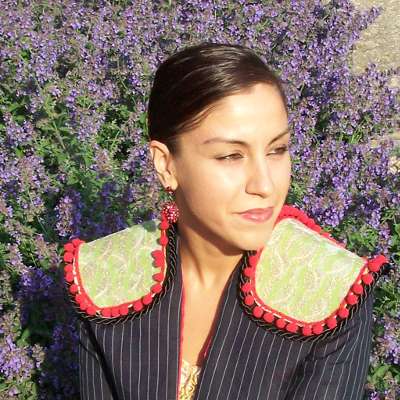On a sunny London afternoon, I rang up Caroline Bowditch, who at the time was sitting in her hotel room in Dundee, Scotland. For those Bachtrack readers that don't know who Caroline Bowditch is, she says: “I would describe myself as a performance artist/maker. A facilitator of learning in all sorts of ways.” She is a self proclaimed provocateur who thinks of herself as “a mosquito buzzing in the ears of the industry”. Passionately, Caroline says the “aim for my work is to create a space to think, feel or believe something different. I say I am a disabled artist openly and that's fine. Everything I do is inclusive, not an afterthought, but embedded in everything.” Caroline is an artist with a disability who has very clear views about herself, the world and the dance industry.
When I heard Caroline's “mosquito” self-reference, I asked her to elaborate a bit on this. “I was asked to give a presentation in 2008. I’d recently heard a quote from Anita Roddick, the founder of the Body Shop, that said ‘If you think you're too small to make a difference, try going to bed with a mosquito in the room.’” Caroline is a mighty woman who is turning many heads and for all the right reasons; even though some liken her to a mosquito in the room. Naturally, I felt I should ask her about inclusive dance and what it means to her. She replied “To be open to who is in the room.” Talk about short and sweet.
I then moved on to accessibility. How accessible is the dance industry? What could be done to make it more inclusive? Caroline emphasized, repeated and was obviously sincere when she said,“I am very thankful and grateful for all of the opportunities I have been given, but for many disabled dancers they are few and far between.” She went on to say “Sometimes it’s hard to differentiate between lack of opportunities available because I am a disabled dancer or because I am a woman. When you look at Associate Artists for places like Sadler's Wells or others, 75% are men. There are men and women making work but somehow the men are the ones that get the larger, higher profile jobs.” Why do you think so? What can be done? And how can we change this? “ This is a gross generalization but men tend be more assertive and so maybe that's why they get more work. Women, historically, are afforded less power, and maybe it is a hangover of that mentality.” Caroline was not being negative but stating her observations of the industry and is perhaps forcing the industry to reflect a bit on how accessible the field really is and who we consider to be successful... Starting to gather why some call her a provocateur.
Caroline is a teacher – a fantastic one I might add – and when asked about her teaching and how and why she travels to the places she does, this is what she had to say: “I am often brought in to see where the communities are – to attract. Some places have an ambition to make their schools or settings more inclusive. People employ me to come in, whether as a provocateur or with experience and confidence about being inclusive. Sometimes I am brought in when others are questioning their ability to go through the process. I don't consider myself an expert. I work with training teachers as well as others of all ages and levels of experience. I’m often seen to be role model.”
Moving on, I wanted to learn more about her new show. Can you tell me about Falling in Love with Frida? “See it if you can!” Caroline laughs. She continues with “It is an intimate show, everyone is close and seats 15-60 people. I am trying to establish a community and honor Frida Kahlo. I am having my own love affair – it is only one-sided though” and we both giggle. Then Caroline gets quiet and says in a deliberate manner “I want to reclaim her as a disabled artist. Her disabilities are implicit in all of her work but we don't see her as a disabled artist. Surrealists have claimed her work surrealist because they couldn't imagine that that was her own reality.” Falling in Love with Frida will be touring to Glasgow, Sweden, Bournemouth. She also reminds me that the work will be at the Edinburgh Fringe Festival, where she will be doing 2 shows a day. And hopefully, the work will go to Mexico, to the Frida Kahlo Museum, in 2015.
Caroline has big plans and keeps herself busy, so it felt like the right time to ask her what is next. She hopes to make a family piece in addition to another project called Beauty Collect, “The work brings together an international group of women who want to challenge the perceptions of beauty. How can women develop a sense of self if they do not see that projected out in the world?”
And to end our conversation I asked her: How would you like to see inclusive dance develop? Which direction should it go in? “My big ambition is that by 2020 the world will be a different place. Anyone who wants to dance, can dance. We won't be talking about inclusive dance we will just be talking about dance. It is not a matter of if, but when.” She then throws a rhetorical question at me “What do you need to be ready for this?”


